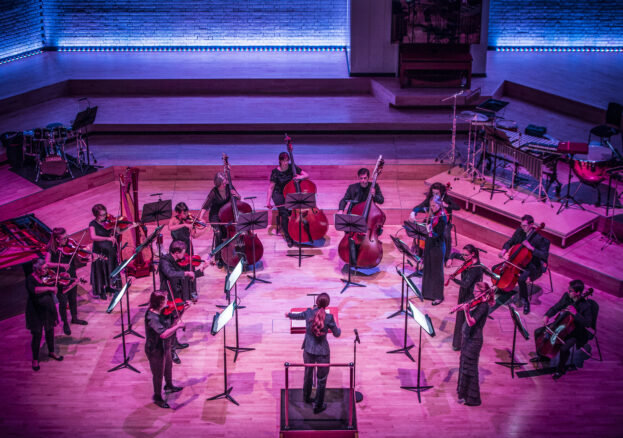Manchester Camerata with RNCM Students and Robin Wallington (conductor)
Johnny James, Managing EditorBook now
Manchester Camerata with RNCM Students and Robin Wallington (conductor)
Always double check opening hours with the venue before making a special visit.

This July, Manchester Camerata performs by side with RNCM students in a concert featuring three wonderful works by Jessie Montgomery, Antonín Dvořák and Felix Mendelssohn.
The evening begins with Jessie Montgomery’s Starburst. Growing up in New York, where her father managed a music studio, Montgomery was “constantly surrounded by all different kinds of music”. Her compositions thus draw on many influences, from African American spirituals to modern jazz. Starburst was commissioned by the Detroit-based Sphinx Organization, which is dedicated to the development of young Black and Latino classical musicians. It’s a short, one-movement work for string orchestra that musically mirrors a galactic starburst with exploding gestures of sound amidst fleeting melodies. A great opener!
Next is Dvořák’s Cello Concerto in B minor, which sees Jack Bailey – an RNCM alumnus and winner of the College’s coveted Barbirolli Prize – take the role of soloist. One of the most loved of all celli concerti, this was Dvořák’s last solo concerto, written in 1894 during the composer’s ‘American period’, in which the music he produced was infused with a sense of homesick longing. It features some of the most achingly beautiful music he ever penned, particularly in the wonderfully lyrical second movement, which quotes a theme from one of Dvořák’s own songs, Leave Me Alone – a favourite of his sister-in-law Josefina, whom Dvořák discovered was gravely ill while writing the work.
Finally, we’ll hear Mendelssohn’s Symphony No. 5, originally conceived to celebrate the Protestant Reformation. Mendelssohn was only 20 at the time, but was already one of the most renowned musicians in Germany, hugely respected as a pianist and conductor as well as a composer. This only heightened Mendelssohn’s shock when the symphony was rejected by everyone he approached to premiere it; not only was it kicked back by the organisers of the 300th anniversary celebrations of the Protestant Reformation in Berlin, but orchestras in Munich, Leipzig and Paris also refused to touch the work. Why? No-one knows for certain; accounts vary from anti-Semitism to the symphony being “too learned”.
If only Mendelssohn, who cast the symphony aside as an unpublished failure, could have lived to see how widely loved it is today. A stirring, richly contrapuntal work, it begins in solemn style, incorporating the traditional Protestant ‘Dresden Amen’, before fanfares push the opening movement in a more heroic direction. Two lyrical, folk-indebted movements follow, before a majestic finale, based on one of the best-known of all chorales, A Mighty Fortress Is Our God, closes the symphony in triumphant style.
Conducting the concert is Robin Wallington, currently the Mills Williams Junior Fellow in Conducting at the RNCM. Known for bringing a driving energy and detailed eye to the wide repertoire he conducts, we look forward to hearing his interpretation of this brilliant programme.
Part of the RNCM’s Summer Season, which you can read more about in our dedicated guide.



























